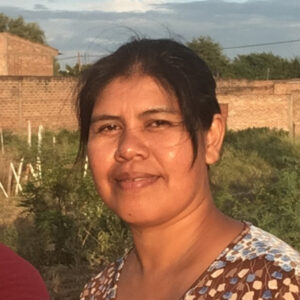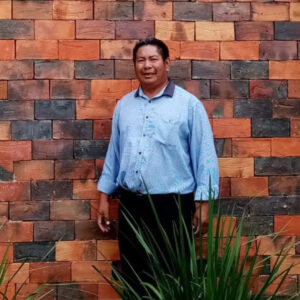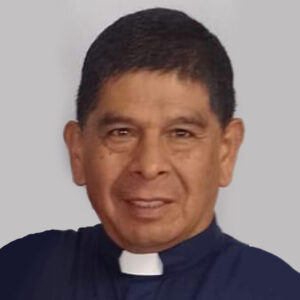Anvil journal of theology and mission
Reflections from three indigenous leaders in Latin America
compiled by Sarah Cawdell, CMS mission partner
In January 2023 Paul Tester, CMS manager in Latin America, interviewed three Christian leaders from among the indigenous people groups of the region with a view to drawing out something of the unique voice of each group in Christian theology. The following is an attempt at a collation of those voices with a view to developing an awareness of the way in which the gospel is both universal in its appeal to all people and all times and places, and at the same time is uniquely experienced in particular places, and within the voice and culture of each people group. I hope that it will allow us to examine again the voice of the gospel within, and challenging, our own cultures and people groups.
Each of these individuals is a second- or third-generation Christian in the Anglican Communion, still uniquely placed within their own culture and people group, with responsibility for serving the church in that place. They are:
- Elvio Cabañas, an Énxet Christian living in Paraguay
- Mirna Paulo, a Wichí Christian living in northern Argentina
- Joel Millanguir, a Mapuche Christian living in Chile
Most of the populations of the South American nations have a dual, or more, heritage. They may trace their heritage from the Spanish or Portuguese colonial past (including West Africa from the transatlantic slave trade) and indigenous people. There are however some particular people groups that, for reasons of history and geography, are still recognisable and function as distinct groups with distinct languages, dress and cultural practices.
Each of these individuals interviewed by Paul Tester has come to faith through the witness of their families and the work of the Anglican Church in their country. Each of them speaks with warmth and appreciation of the fellowship of the missionaries who drew alongside their parents and grandparents, sharing the gospel and living in company with those among whom they ministered.
Paul asked each one in turn about their journey to faith and in faith, and in particular how the Christian faith challenged their own indigenous culture, and where the culture was affirmed and maintained by those who are disciples of Christ.

Mirna Paulo, a Wichí Christian living in northern Argentina
Mirna, who is from the Wichí people, in the north of Argentina, appreciates her faith learned from the example and teaching of her parents and grandparents. She particularly draws strength from the ever-present Jesus, who is not confined to place, as “idols” might be, in whatever moment and whatever place she can pray to him. She says, “I needed to choose to always walk alongside Jesus and invite him to change me.” She describes how the presence of Jesus comes against the fear that inhibits others in her community, and protects her and all Christians. She speaks of those who know Jesus as being able to maintain strong community relationships, which builds up the community and brings hope to the people. “If someone doesn’t have Jesus Christ in their lives there’s no way forward for the indigenous people, the world is a disaster, there is no way of thinking about looking to the future.”
Mirna goes on to describe how this Christian hope has enabled her people, and other indigenous people groups in the area, to work together for the rights to their land and their cultural heritage, saying, “I couldn’t walk away from the joyful, eternal life.” Recognising that missionaries were not always viewed as safe people or welcome in her culture, she also recognises the benefits of health and education that the missionaries brought along with the gospel. For example, learning from the value that the nation of Israel had for land enabled the Wichí people to value the places they inhabit in the face of government and multinationals’ attempts to purchase the land, and thereby disinherit indigenous people. Mirna says, “Many times hope is what is missing, or it’s very weak. Being with Jesus gives a lot of encouragement and my communities value whatever is happening in the churches.” (It is helpful to know that for these Christians much of life centres around church activities, so that the Christians are always living and working together, encouraging one another in faith.)
A valuable lesson the Wichí offer to the Christian faith is a true appreciation of stewardship of the land: not taking too much of a supply, even when there appears to be plenty, but only taking what is needed, and respecting the times when certain meats or fruits are not readily available. Mirna observes, “Just take what you need. Because there are those who also need to take what is needed. And nature itself requires it. So for the men who hunt animals, there are certain times when you should hunt those animals. And there are certain times when that’s not the case. They’re not at the times when they have young… And so that’s when you shouldn’t touch them, shouldn’t go near them. But there are times when yes, you can, when it’s allowed, that you can go and hunt, and catch the fish in the rivers as well. You’ve got to respect the times and everything that has to do with the care for nature.” Similarly, when something is taken as a food stuff, for example fish, it is important to use every part of it, even the skin and the bones, and not to waste or dishonour any part of it. Again, she says, “In the search for honey, you mustn’t exaggerate what you take, however easy it might be to find, and however plentiful it might be.”

Elvio Cabañas, an Énxet Christian living in Paraguay
Elvio Cabañas is a pastor in the Chaco region of Paraguay, where a number indigenous groups live. He lived on a cattle ranch that had been bought by the Anglican Church as a place for the Énxet people to live safely. He grew up in the church there and learned enough languages to be able to work in the church as a Bible translator. He speaks particularly of the value of music in transcending literacy as a way of discipleship and development. He says, “For people who didn’t know how to read, at least they could hear and learn to play music, and we still continue to do that sort of thing.” Elvio learned leadership and pastoral skills from his youth, working within the church and with his father. He went away for further studies when he was already trained as a minister of the gospel and had done some valuable translation work on the New Testament.
Reflecting on the Énxet culture, Elvio recognises the valuable place of local plants in healing and medicine. He describes how his grandfather was a herbalist within the Énxet community and how his practices changed when he became a Christian, a time he describes as when “the moment of God had arrived among the indigenous peoples”. While rejecting a practice of “fermenting the plants to see which spirit it’s for, whether it’s to heal people or to damage or hurt people”, Elvio speaks of the ongoing value of this botanical knowledge to treat various sicknesses. This was particularly true during the recent pandemic but was practiced in ways that are different to those of his forebears. He says, “We just squash the plants, we don’t fast and we don’t ferment them now. We are guided by the elder as to how much of it to use… Not working like a shaman but sharing knowledge.”
Elvio speaks warmly of the extraordinary unity the love of Jesus gives across cultural boundaries, so that “through the gospel we all integrate, we become one person if you like” and that the “unity through the gospel that unites us should strengthen us as well, to respond to challenges”. Speaking of the work of the missionaries, Elvio values their accompaniment: “That they came and lived with us, and weren’t afraid of the cultures. That’s why we identify the gospel with relationship, the accompaniment and the work that the missionaries did.” He goes on to speak of the next generation becoming missionaries, reaching out to others in the Chaco and accompanying them as they were accompanied.
Elvio speaks of the value of cultural understandings, a good diet and right care in pregnancy, and stresses the importance of learning from the culture, including for those in the medical profession. He says, “The doctors need to know and to consult what is the indigenous way of treating people: the indigenous norms and rules.”

Joel Millanguir, a Mapuche Christian living in Chile
Joel Millanguir, a Mapuche Christian living in Chile, again began by first honouring his parents and family for their part in his own coming to faith and growth in discipleship. He describes how coming to faith can bring opposition from within his community. He notes, “When a Mapuche accepts Jesus as Lord and Saviour, they [some other Mapuche] consider him a traitor. They say they have their own culture and we have our own religion, why do we have to accept religion that has come from outside?” At the present time in this particular context there is a move to a radical, and sometimes violent, expression of Mapuche culture in order to reclaim the particular language, dress, music and other cultural traditions of this people group and the land. While many Mapuche are content to live peaceably in some Mapuche regions, there are those who advocate violence against the colonial past to such an extent that recently both Catholic and Protestant churches have been burned down. Speaking as a Mapuche Christian in this context, Joel recognises the need for courage and faith among his fellow believers. He says, “A few years ago we brought out a book called Mapuche and Anglicans, which talks about how the Mapuche took on the Christian faith.” Reflecting on the book, Joel speaks of the challenge of determining where the gospel might lead him to affirm or to challenge and reject aspects of his culture. He describes how Christians can maintain Mapuche language, dress, foods, musical instruments, art and working together as a community. Joel remembers a great tradition: “When someone had a job to do and when it needed a lot of work doing, the whole community would join together and help that individual, that family in the work… That desire to help those who are in need, that’s good.” But a point of conflict with the Mapuche religion and culture is in the Mapuche understanding of God. “There’s a male god and a female god and different spirits that they invoke at different moments.”
Joel speaks of the value of Christians among the Mapuche people continuing to work missionally, preach the gospel and speak out in advocacy for peace and unity, believing that “the Lord can change lives, families and communities. We had the highest rate of alcoholism in the country. The church used strategies to help people come out of alcoholism, which was consuming a lot of communities and leading families into poverty. The gospel wasn’t just about talking. It was something that was practical.” He goes on to say that “where the church has continued to grow and to be faithful,” the pastors have spoken out in advocacy for “peace and unity”. He also speaks of the church as a non-violent mediator between government, multinationals and the Mapuche people in the acquisition of land and the methods of reforestation.
Joel describes the reconciling work of the gospel, evidenced in the missionaries not coming with a Bible and a sword, but with concern and love for those who are most marginalised: installing hospitals and schools, bringing people out of extreme poverty. He notes that “when the Anglican Church arrived at another community, that becomes a community of peace, as Paul says, not with the sword and the shield but with the Word of God”.
In summary, these three each expressed the particular blessings that the coming of Christianity has brought in in their own place and among their people, feeling that the gospel gives dignity, hope and unity within and across their cultures; by giving cross-cultural experience, it has enabled the potentially disenfranchised to find their voice in the wider community.
In writing this piece I have been helped most considerably by Cristóbal Cerón, presbyter of the Anglican Church in Chile, and temporary resident at the CMS community house in Oxford.
To hear more indigenous voices from Latin America, you can find a selection of videos from a landmark Indigenous Peoples Mission Congress held in Salta, Argentina in October 2022 here: https://churchmissionsociety.org/blog/experience/indigenous-mission-congress-day-by-day/